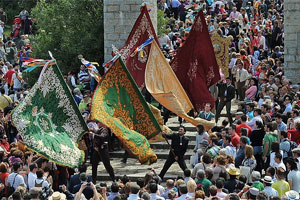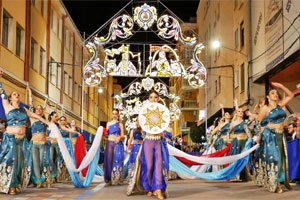The Fallas of Alzira
What are the Fallas of Alzira?
The Fallas of Alzira is a popular festival celebrated in the city of Alzira, in the province of Valencia. This festival is held in honor of Saint Joseph and takes place during the week of March 19th, coinciding with Father's Day.
Similar to the Fallas of Valencia, the festival involves the construction and burning of cardboard and wooden monuments, known as "fallas". These fallas usually depict humorous or satirical scenes from everyday life, politics, or popular culture.
During the week of the Fallas of Alzira, various events are held, such as fallas parades, paella contests, musical performances, and pyrotechnic shows. The highlight of the festival is the night of March 19th, when the fallas are burned in a large bonfire.
The Fallas of Alzira are a deeply rooted tradition in Valencian culture and attract many tourists every year. However, like all popular festivals, there may be some associated risks, such as the possibility of fires or accidents during the burning of the fallas. For this reason, it is recommended to always follow the instructions and safety measures established by local authorities during the celebration of the Fallas of Alzira.
How are the Fallas in Valencia different
Although the Fallas in Alzira share many similarities with the Fallas in Valencia, there are also some important differences between the two celebrations.
Another notable difference is the focus of the fallas. While in Valencia, the fallas are usually very critical and satirical in relation to politics and society, in Alzira the fallas tend to have a more festive and traditional focus, with themes more related to local history and culture.
There are also some differences in the events and activities that take place during the week of the Fallas. For example, in Alzira a "cant de l'estoreta" contest is held, a competition in which participants sing popular songs while burning a miniature doll. In addition, in Alzira a paella contest is also held, which is not part of the Fallas in Valencia.
Tips for visitors
Wear comfortable clothing and footwear: Alzira is a city with many streets and squares to explore, so it is recommended to wear comfortable clothing and footwear to walk around and explore the city.
Try the local cuisine: As mentioned before, Alzira has a rich and varied cuisine. Take the opportunity to try some typical dishes of the region.
Make sure to locate yourself in a safe place and away from the launching area. Do not get too close to the safety barriers and follow the instructions of the event staff.
Do not touch the fireworks: Fireworks can be very dangerous if mishandled. Never touch or manipulate rockets, firecrackers, or any other type of pyrotechnic material.
Be careful with sparks and ashes: The sparks and ashes that come off fireworks can be dangerous. Avoid being under the trajectory of the fires and do not place yourself in windy places.
Do not wear flammable clothing: Make sure to wear comfortable and appropriate clothing for the occasion. Avoid flammable fabrics such as nylon, polyester or any other synthetic material.
Do not play with fire: In addition to fireworks, it is also important to avoid the use of fire in any other activity. Do not smoke near the fireworks and avoid any type of game or activity that involves the use of fire.
Respect the rules and instructions of security personnel: It is always important to respect the rules and instructions of the security personnel in charge of the event. They are there to protect your safety and that of others, so you must follow their instructions at all times.
Origin and History
The Fallas in Alzira have a long tradition dating back to the 19th century. Although it is not known exactly which was the first Falla planted in the city, it is believed that the tradition was imported from Valencia, where the Fallas had already been celebrated for centuries.
During the Bourbon Restoration period, the Fallas in Alzira became very popular and became one of the city's main cultural events. At that time, the Fallas were planted in the Plaza Mayor and were the subject of great rivalry between the different neighborhoods and guilds of the city.
In the 1930s, the Fallas in Alzira were suspended due to the Civil War and were not resumed until the 1950s, when a group of young people decided to recover the tradition and plant a Falla in the Town Hall Square. Since then, the Fallas in Alzira have evolved and adapted to the new times, but always maintaining their essence and their festive and participatory character.
Today, the Fallas in Alzira are one of the most important festivities in the city and attract thousands of visitors every year. During the days leading up to the plantà (the planting of the Fallas), the different Fallas committees work intensively to build the wooden, cardboard, and papier-mâché.
What to see in Alzira, besides its Fallas
Alzira is a city with a rich history and cultural heritage. Here are some recommendations on what to see and do in Alzira:
- The historic center: Alzira's historic center is a charming place, with narrow streets, picturesque squares, and historic buildings such as the church of Santa Catalina and the Palacio de los Milà.
- The Alzira bridge: This Roman bridge is one of the city's most emblematic monuments. With a length of 248 meters, it is the longest bridge in the Valencian Community.
- The Casa de la Enseñanza museum: This museum is located in an 18th-century historic building and houses a collection of contemporary art, as well as objects related to the history and culture of Alzira.
- The Murta Natural Park: This beautiful natural park is located on the outskirts of Alzira and has a great variety of flora and fauna. It also houses a 13th-century monastery that can be visited.
- Nearby beaches: Alzira is located about 20 kilometers from the Mediterranean coast, so it is possible to visit some nearby beaches, such as Cullera beach or Tavernes de la Valldigna beach.
- Local gastronomy: Valencian cuisine is very varied and delicious, and Alzira is no exception. It is recommended to try typical dishes such as Valencian paella, baked rice, fideuá, or all-i-pebre (eel stew).
These are just some recommendations on what to see and do in Alzira. The city and its surroundings have much more to offer, so it is recommended to explore and discover everything this beautiful region has to offer.
Recommended crafts and shopping
Crafts
Alzira is known for its production of ceramics and clay crafts. Some of the most common pieces are decorative plates, bowls, and figures of animals and plants. Other ceramic objects such as vases, flowerpots, and cups can also be found.
Another popular craft in Alzira is basketry, especially that made with palm leaves. Palm baskets and objects are popular as souvenirs and can also be found in local markets.
What to buy?
As for shopping, Alzira has a great variety of shops and markets where local products and crafts can be found.
Some of the most outstanding shops and workshops where you can find local crafts are:
- Cerámica Daniel: This artistic ceramic workshop is located on Santiago Rusiñol street and offers a wide variety of decorative pieces, tableware, and other handmade ceramic objects.
- La Cerámica de La Alcudia: This ceramic workshop is located in the nearby town of La Alcudia and has a wide variety of products, from traditional pottery to decorative and contemporary objects.
- Taller d'art: This art and craft workshop is located on Francisco Arlandis street and offers a great variety of handmade products such as jewelry, decorative objects, and accessories.
- Alzira Municipal Market: The municipal market is an ideal place to find fresh and quality products, including fruits, vegetables, meats, and fish, as well as local products such as sausages and wines.
In addition to crafts, Alzira also has a wide variety of shops and stores where you can find all kinds of products, from clothing and footwear to gift items and souvenirs. Some of the most commercial streets in the city are Mayor street, Rey Don Jaime street, and Rambla street.
Typical Popular Cuisine
The cuisine of Alzira is very varied and influenced by Valencian cuisine. Some typical dishes and products of Alzira and its region are:
- Paella: Paella is the most well-known dish of Valencian cuisine and is also very popular in Alzira. It is a rice dish cooked with vegetables, meat or seafood, and spices such as saffron.
- Arroz al horno: This dish is a variant of paella in which the rice is cooked in the oven with meat, sausages, vegetables, and spices. The result is a delicious and very aromatic dish.
- Fideuá: Fideuá is a dish similar to paella, but short noodles are used instead of rice. It is cooked with seafood, fish, and vegetables, and seasoned with garlic, paprika, and other condiments.
- All-i-pebre: This traditional stew from the Valencian Community is made with eels, potatoes, garlic, paprika, and other condiments. It is a tasty and hearty dish that is usually served with bread.
- Pastissets de boniato: These typical sweets from Alzira are small pastries filled with sweet potato and powdered sugar. They are a very popular dessert during local festivities, such as the Fallas.
- Horchata: Horchata is a refreshing and nutritious drink made with chufas (a tuber similar to almonds) and water. It is a typical drink from the Valencian Community that can be found at any time of the year.
In addition, the region has a great variety of fresh and quality products, such as fruits, vegetables, fish, and seafood, which are used in the preparation of tasty and healthy dishes.





